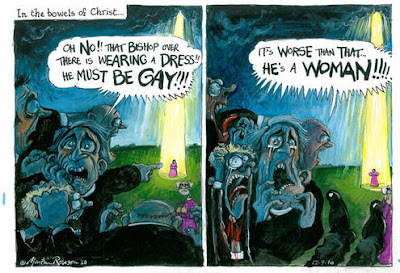Women in the Catholic Church
Ordaining women priests would be a way for the Catholic church to tackle the crisis of recruitment to the priesthood. Women are often strong advocates of the values of church life; women are active agents in the organisation of church community events; women often lead the way in the Catholic education system (especially mothers in supporting school events) and what do the gospels show about the women in the early church?Women were THERE
Women were present in key events throughout Jesus’s life, including being selected to be the first witnesses to the Resurrection. Given historical, community or spiritual perspectives, there are surely no sensible reasons for the Catholic authorities to put restrictions on what women are capable of.It has happened and it happens anyway
In extremis, women have had priestly powers in the past: during times of plague, women were allowed to baptise, give the last rites and bury people (especially when the male priests were too afraid to enter a village.) “Emergency baptisms” by midwives were encouraged by the medieval church when a priest could not get to a dying baby in time. The Anglican church in the present time has fully embraced female vicars. Many other religions throughout human history have given women prominent roles in sacred rites: from Ancient Egyptian priestesses to modern day female rabbis.Jesus was a feminist
Jesus’s treatment of women was radical:- He ignored ritual impurity laws about menstruation (Mark Chapter 5 Verse 25)
- He stated men and women should be treated equally in divorce (Mark Chapter 10 Verse 11)
- He expressed compassionate concern for widows (Luke has six positive references to widows)
- parables often have parallel male/female stories (see the stories starting at Luke 2:25, Luke 4:25, Luke 4:31, Luke 7:36, Luke 17:34)
- He interacts with “sinful women” (Luke Chapter 7 Verse 37)
- He accepted women in His inner circle (Luke Chapter 8, Verse 1)
- He taught women contrary to the restrictions on female education (Luke Chapter 10 Verse 38)
- He used equalizing language like “daughters of Abraham” (Luke Chapter 13 Verse 16)
- He talked to foreign women (John Chapter 4 Verse 7)
- and, to cap it all, the key event of Christianity shows the men running away from the Crucifixion (apart from John) or disbelieving the Resurrection but
- the women are fully present at the death of Jesus and given the first sightings of the Risen Christ.
Paul at his worst
Much of what we have inherited of restrictive Christianity comes from the letters of Paul or the Old Testament. The words of Jesus are far more subversive and simple. And therefore challenging with their focus on love, forgiveness and mercy, traditionally feminine qualities. In Colm Tóibín’s Testament of Mary, Tóibín presents an authentic woman insisting on the truth, even though the gospel writers caring for her have “outstayed their welcome.” Mary confides that “Words matter” and she resists the attempts of her carers (interrogators? jailors?) to remember events in Jesus’s life that suit their own narrative. One of her minders, she complains, “is ready to scowl impatiently when the story I tell him does not stretch to whatever limits he has ordained.” Mary wants to tell the real story, “or else everything that happened will become a sweet story that will grow poisonous as bright berries that hang low on trees.” Paul, rabidly egotistical after his conversion on the Road to Damascus, I think, has been the seed-source of the poisonous berries in terms of the Catholic Church’s attitudes to women. Paul’s misogyny is so yesterday…. |
| Hans Speckaert's Conversion of St Paul on the Road to Damascus |
Paul at his best – 1 Corinthians Chapter 13
If I speak in the tongues of mortals and of angels, but do not have love, I am a noisy gong or a clanging cymbal. And if I have prophetic powers, and understand all mysteries and all knowledge, and if I have all faith, so as to remove mountains, but do not have love, I am nothing. If I give away all my possessions, and if I hand over my body so that I may boast, but do not have love, I gain nothing.
Love is patient; love is kind; love is not envious or boastful or arrogant or rude. It does not insist on its own way; it is not irritable or resentful; love does not rejoice in wrongdoing, but rejoices in the truth. Love bears all things, believes all things, hopes all things, endures all things.
Love never ends. But as for prophecies, they will come to an end; as for tongues, they will cease; as for knowledge, it will come to an end. For we know only in part, and we prophesy only in part; but when that which is perfect comes, the partial will come to an end.
When I was a child, I spoke like a child, I thought like a child, I reasoned like a child; but when I became an adult, I put away childish things. For now we see through a glass darkly, but we will then see face to face. Now I know only in part; then I will know fully, even as I have been fully known.
And now abideth faith, hope, and love, these three; and the greatest of these is love.







No comments:
Post a Comment